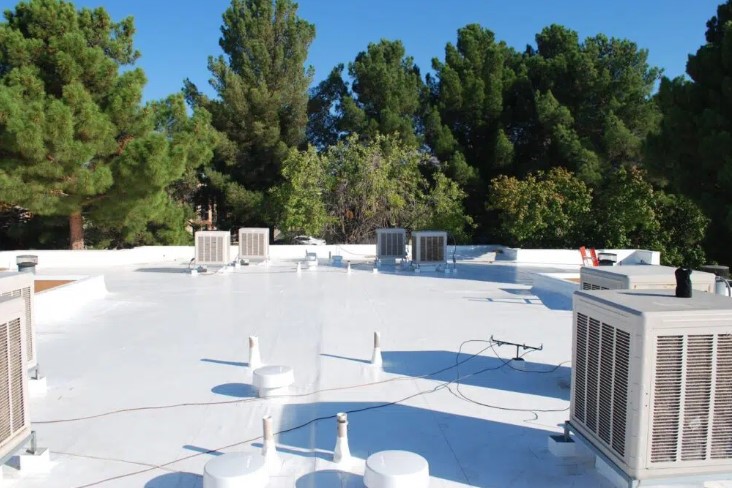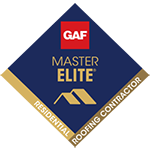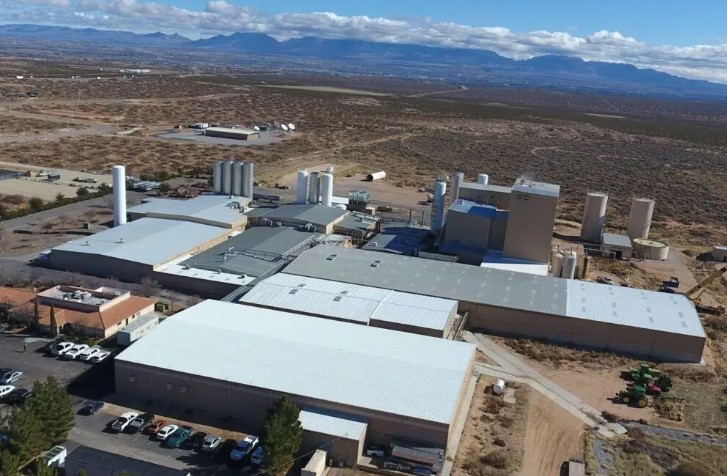
There’s a lot hanging on your commercial roof. There are likely businesses, employees, and/or customers depending on it. As such, you don’t want your roof to fall victim to common commercial roofing issues that are often preventable with some timely maintenance. One way to extend the lifetime of your roof and enhance its performance is by installing an adequate type of roof coating, but which one is the best for you?
Here’s what you need to know about the different types of roof coating.
What is a Commercial Roof Coating?
Roofs take a heavy beating every day, from powerful UV rays to storms, hail, wind, and heavy rains. When a roof lacks proper coating, it may start to degrade and deteriorate. As the material deteriorates, the performance of your roof begins to decrease.
When a roof coating is applied, the material provides a new layer of protection against sun and moisture. Coatings are designed to fill in the little gaps, cracks, or damaged spots along roofs and elongate the time it is functional.
Benefits of Quality Roof Coatings
Adding a layer of roof coating to your commercial roof has several benefits for your property and your investment.
- Cost-effective: Roof coating is cost-effective compared to redoing the roof or repairing roof damage or a major leak.
- Increases shelf life of your roof: Extending the life of your roof means you’re protecting your investment and maximizing your expenditures.
- Reduce energy cost: A quality roof coating can help you reduce energy costs because of its energy-efficiency properties. Many will reflect UV rays and help regulate temperature.
What Are the Different Types of Roof Coatings?
Depending on the material, style, and installation of your current roof, different roof coating materials will work differently. In order to find the right material for your roof, talk to a qualified roof professional to assess what type of material fits you best.
While all of these commercial roof coatings exhibit similar features in terms of reflecting UV rays and protecting from moisture, each one boasts unique qualities.
Acrylic
This type of coating is a long-lasting, durable, and water-resistant coating often referred to as the original or go-to elastomeric roof formula. Acrylic-based materials were engineered and designed to provide resistant protection against UV rays. They are formulated with 100 percent acrylic polymer and significantly reduce surface temperature by up to 100 degrees Fahrenheit. They can be applied in multiple coats to offer added protection.
It might be right for large flat commercial roofs that require strong UV protection. Be aware that it might not be ideal for places with very cold temperatures. Acrylic roof coating is also one of the least expensive.
Silicone
This material is one of the most popular materials in the commercial roof restoration business. Silicone material offers great resistance to ponding water. One of the most common issues that commercial roofs experience is when water ponds or pools seep into the material.
It might be right for buildings or structures in an area with frequent rain. Silicone can provide outstanding protection.
Fluoropolymers
This material is a blend of high-performing resins and fluoropolymer lubricants. One of their leading characteristics is its dry film lubricant that produces a slick and smooth final product with resistant chemical and anti-corrosion qualities.
It might be good if you’re looking for an aesthetically pleasant coating that exhibits excellent color retention, adhesion, and resists all kinds of extreme weather conditions.
Urethane
Polyurethane coatings are an incredibly durable type of coating. These are easy to install roof coatings that go on quickly and provide long-term protection.
It might be good for you if you need something that’s more resilient. Urethane roof coatings are a little more impact-resistant than the other types of coatings. If your roof has a high-traffic area, this coating material might be right for you.
Questions to Ask Your Commercial Roof Specialist
When deciding on the right time of coating for your commercial roof, take some time to investigate what material is the right one for your building. Don’t hesitate to ask your commercial roofer for their advice and expertise.
Questions to ask your roofing professional include:
- What material matches up best with the current roof and roofing material I currently have?
- Will we have to do any removal of material?
- What coating will protect the current material?
Feel Confident in a Job Well Done With Professional Commercial Roofers
Using the right material with the proper installation is essential to maximize your expenditures. A bad installation can cause commercial roofs a lot of problems down the line. Make sure you are working with an experienced and professional company.
Subscribe to Smith and Ramirez Roofing's Blog





Comments